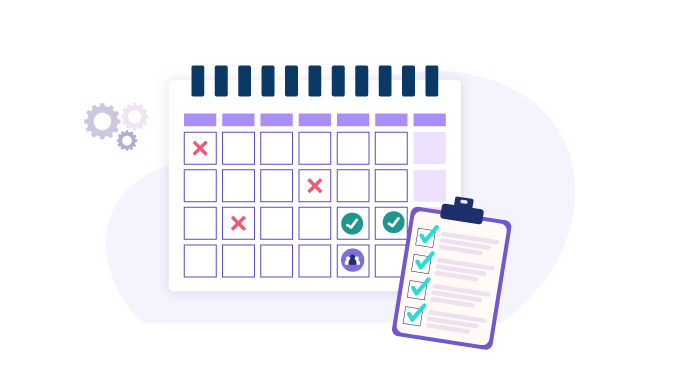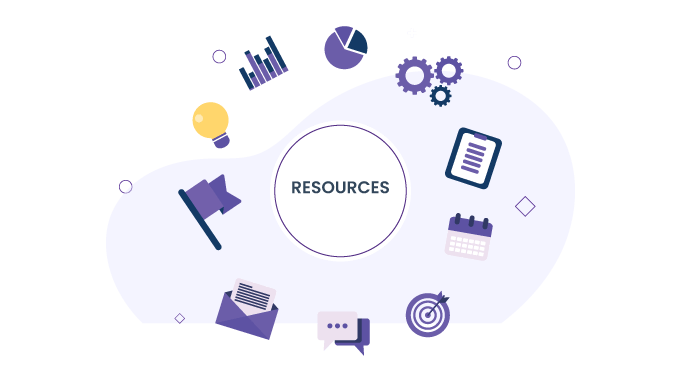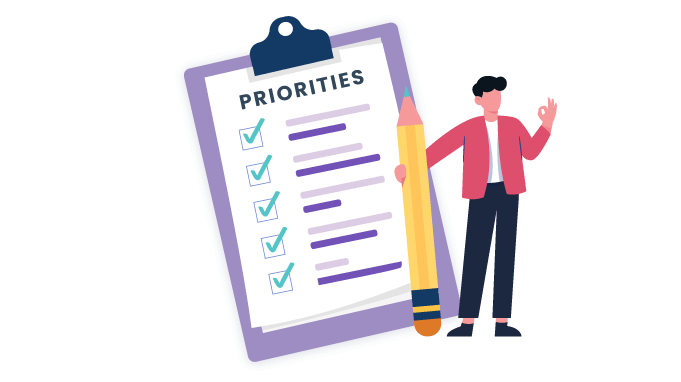10 Ways To Develop Organizational Skills Among Employees
What do we understand by organizing in general? It means keeping things in proper order.
Organizing a workplace is no exception. Your employees will benefit personally in their daily activities if they practice organizational skills effectively. It helps to get a sense of control, which leads to increased productivity at the workplace.
Do your employees constantly keep complaining about the workload and the deadlines? If that's the case, leaders should support the need for organizational skills development techniques.
What are Organizational Skills?
Organizational skills are those skills that help your employees to do their work efficiently. These skills are used to establish structure and order. Organizational skills also increase productivity and performance.
With strong organizational skills, the employees develop a firm grip on time management and stay goal-oriented. When there is order to your workplaces, there is low stress and a lesser chance of going wrong.
Interestingly the span of the skills falling under organizational skills is very confusing. Quite obviously, if the implementation were so easy, everyone would desire an effective and efficient workforce, isn't it?
On the other hand, are these skills good enough to bring about all the changes in the organization's functioning, or is there something more to it?
Having a to-do list, sticking to deadlines, and managing the break times shall enable achieving objectives and being organized.
The answer is yes and no both. Organizational skills are transferable and trainable skills that are employee-centric and manager-centric. These skills have to be absorbed at the molecular level, i.e., if an employee is efficient and manages their time well, they will always carry those skills to whichever place he/she goes to.
Some ways to improve your organizational skills are:
- Strategic Planning and organizing
- Proper time management
- Goal setting
- Delegating work
- Good Communication
- Team management
- Maintaining a healthy work-life balance
Also read: 5 Importance of Organizational behaviour at workplace
Why are Good Organizational Skills Important in the workplace?
Efficiency

The most significant advantage of organizational skills is Efficiency. It helps to increase productivity through effective time management. A standard professional spends a lot of time making mistakes, cleaning up clutters, and mostly time management.
In comparison, an organized worker who develops time management skills will put in better efforts and performance.
For example, an individual who focuses on revenue growth without keeping a tab on overhead costs will end up being at a loss. In contrast, an organized professional will balance both, thus working efficiently for the company for the same amount of time.
Team Management

Team management is another aspect that plays a vital role in the management of team members. Managing people requires deciding the organizational priorities and allocating the goals according to the skill set of the individuals.
Delegating responsibilities to people, setting project deadlines, and conducting timely performance evaluations are the necessary skill sets of managers. They are essential in creating a more efficient work environment.
When team members are managed efficiently, they work better and build great peer relationships.
Builds Trust and Morale

The benefits of good organizational behavior trickle down into daily external activities smoothly. Forming a sense of trust and professionalism in the organization wins the trust of your people. And everyone appreciates an image of reliability and control.
Either you are working on customer acquisition, promoting your business, organizing your office, and managing appointments with a potential customer or existing customers, your organization's perception shows that you have a clear focus and clarity. It also helps in strategic liability to deal with varied tasks successfully.
Reduce Stress

Organizational skills also help in reducing the unnecessary stress faced by the employees at the workplace. They reduce the clutter from the system. When the information is available readily, and things look planned, the employees will be more confident about your tasks. There will be less room for unnecessary congestion.
An organized workplace imparts positive vibes. People are most likely to be happy, clear-headed, and focused. As we see, employees with strong organizational skills will be efficient and help achieve organizational success.
Here is another fun fact. Organizational skills are not inborn. They are acquired skills and meticulously developed over time. One needs to improve organizational skills like any other soft skill.
10 Tips on organizational skills that will help your employees to excel at work:
1. Time management

Time management is planning and exercising strategic control of one's time spent on various activities. This will help your people be more innovative and take up new challenges.
For example, since most of your employees are working from home, there are many distractions right now, starting from family to guests. But when this becomes a daily event, it's time to take action.
A proper time management plan can help you break down large targets into achievable tasks, and it becomes simple for employees to complete those tasks on schedule.
Good time management requires you to see the bigger picture. What are the deadlines? What is the necessary amount of work? How many people are working on a particular project?
Poor time management can result in unwanted stress, poor work quality, lack of focus, and inadequate professional image.
Some of the ways for excellent and efficient use of time are-
- Help employees to plan their work
- Ask to Prioritize their daily tasks
- Avoid multitasking
- Cut off distractions
- Schedule your break timings
- And most importantly, accept your limitations.
We have only 24 hours but how we use those 24 hours defines who we become.
2. Planning

There is a saying, "if you don't plan, you plan to fail." With the help of proper planning in the future, you can hugely reduce the number of things that may go wrong. You can reduce the risk of uncertainty by arranging activities in the best way possible.
The ability to plan is the most important organizational skill of any successful person. Planning helps us identify the solutions to all our problems. It allows your employees to direct their energy towards specific activities. With fewer distractions, they are bound to be more productive.
Good planning includes elements such as time management, delegation, physical organization, and mental organization.
3. Scheduling

Scheduling will help you to get organized. Even though it's similar to planning, it has its own importance. Scheduling is an underrated method for enhanced employee management.
By scheduling, your employees can have an idea about the work you are doing. It also shows the grip you have towards work. It helps to keep a balance of different projects easily.
Scheduling encompasses work, meetings, breaks, and every part of your professional daily life. With the help of scheduling, it helps in prioritizing tasks.
Steps for scheduling are-
- Allow employees to plan the scheduling activities
- Arrange the activities in order
- Identify the resources needed for each task
- Estimate the time duration needed to complete each task
- Schedule the development
- Monitor the schedule
4. Resource Allocation

Resources are extremely valuable. Efficient resource allocation is required to be cost-effective so that it doesn't fall off the budget.
Organizational skills, in this sense, mean being aware of the resources available. It's also about identifying which teams will be able to transform the resources into solid business returns.
If you can't measure the resources, there will be wastage of it. Sometimes it might not be possible to optimize all the resources available at one go.
5. Delegation

Delegation is the process of allocating and entrusting work to another person. Your employees can't handle each aspect of a project by themselves. It will require a lot of time and energy, so delegating tasks is an essential organizational skill.
An organized leader is aware of the strengths and limitations of the team. It will assist in delegating tasks to those who are capable of handling them.
6. Prioritizing

Prioritizing is organizing tasks so that the most important tasks are done first. Employees should have clarity of the task so that they can prioritize better. Thus it will help to maintain clarity of the ultimate goal.
Capable of prioritizing tasks will make your life easier and less stressful. An organized leader creates a to-do list and understands which deadlines come first, which leads to better planning.
With practice, you become more confident to understand which task needs to be completed first.
Disorganized employers handle tasks in a haphazard manner which leads to energy and time waste. Prioritizing helps to keep things on track and complete them on time.
7. Collaboration

Collaboration is a group of employees who work together and contribute their skill set to achieve a common goal. Collaboration is beneficial for both the organization as well as the employees. It is a skill about collaborating with others that will significantly benefit the outcome of the project.
Collaboration is not something that can be forcefully imposed on employees. Good collaboration occurs where there is healthy workplace culture.
To increase employee engagement, you can organize informal social events. In informal gatherings, employees get to know each other more and form bonds.
Instead of high-budget team gathering events, you can organize small social events meetups. This will save you money and boost teamwork and team spirit.
8. Setting Goals

Every leader with good organizational skills should be goal-oriented. You should be able to distinguish between short and long-term goals. By staying focused on the plans, you can achieve goals with Efficiency.
Some of the steps for setting goals are-
- Brainstorming goals.
- Prioritize goals in a list and choose the employees you want to involve
- Determine the objectives and plan of action for each goal
- Proceed into action. Continual follow up of the employees
- Evaluate the progress
- Be flexible in changing goals with varying situations
Try to keep a record of goals and encourage the employees to review their progress with those goals from time to time. For this, you can use Objectives and Key Results(OKR) and Key performance indicators KPI.
OKR is a combination of goal-setting tools that align goals and ensure your employees work collaboratively with measurable results. It can be done by using spreadsheets or OKR software.
Key performance indicators are measurable performance values that tell how business objectives are performing. And when performance is measured, the rate of improvement increases.
Read More: The Ultimate guide on understanding KPI
9. Maintaining Efficiency

Efficiency and organization go hand in hand. Efficiency necessitates planning because smoother projects run the few problems it arises. Being efficient allows you to know where you are at any given point in time. It is due to organizing things well to prevent problems from occurring.
Some tips for maintaining efficiency are-
- Delegate responsibilities
Giving responsibilities to your employees helps them to gain skills and leadership experience. This will increase productivity in an efficient manner - Employee recognition and rewards
Recognizing your employees for a job done can make them feel valued and motivate them to keep working hard. - Give each other feedback.
Through performance appraisals, give employees feedback on their performances. Let them know where they are excelling and what areas need improvement.
10. Communication

In an organization, effective communication is one of the key organizational skills. It maintains productivity and a strong relationship among employees. And in present times, it has become essential after the covid 19 outbreak since most employees are forced to work remotely.
It is also important how leaders communicate with their people. It builds trust and high morale among employees and leads to better productivity at the workplace. A good leader invests a lot of time and energy into delivering clear lines of communication.
Employees who communicate effectively with their teammates, managers, and customers are more likely to perform well than others. Knowing how to communicate well is definitely a valuable skill.
Poor Communication skills will lead to alienation and impact the way people work. It is hugely demotivating and leads to undue stress.
Bottom Line
Organizational skills are an asset to the company. They are the healthy habits or tools that enable your workforce to stay focused, motivated, and efficient in day-to-day tasks and give the team energy, strength, and mental space to achieve the desired result.
For new hires, a lot of times, these habits are not reflected in the resumes. It is best advised to have feedback from ex-employees for their feedback and judge their approach to things using short case studies.While it may not be possible to find all these skills or habits in a single candidate at once, the presence of a few of these will ensure that the person you are looking at is already on his path and clubbed with the feedback, a good hiring decision can be made.

















